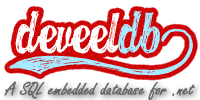21 namespace Deveel.Data.Sql.Expressions {
25 Arguments = arguments;
26 FunctioName = functioName;
44 data.
SetValue(
"FunctionName", FunctioName);
45 data.
SetValue(
"Arguments", Arguments);
override void GetData(SerializeData data)
void SetValue(string key, Type type, object value)
Describes the name of an object within a database.
SqlExpressionType
All the possible type of SqlExpression supported
object GetValue(string key)
SqlFunctionCallExpression(ObjectData data)
Defines the base class for instances that represent SQL expression tree nodes.
SqlFunctionCallExpression(ObjectName functioName, SqlExpression[] arguments)
static SqlFunctionCallExpression FunctionCall(ObjectName functionName)


 1.8.10
1.8.10